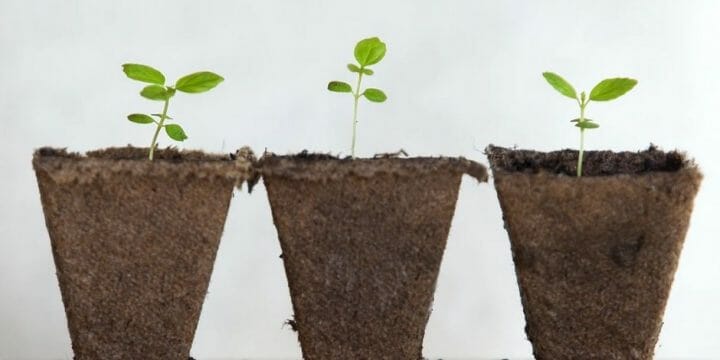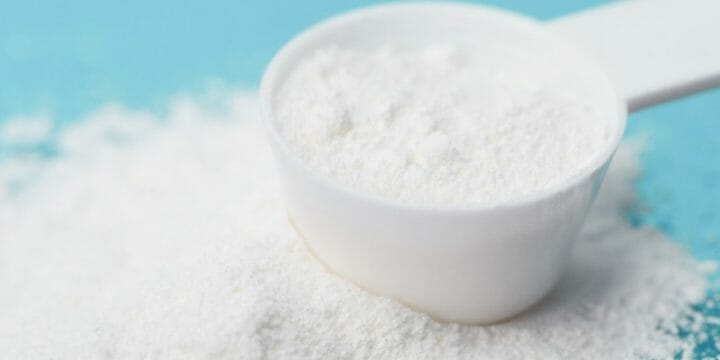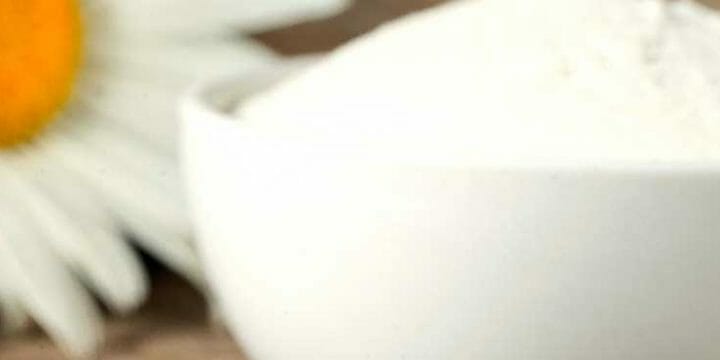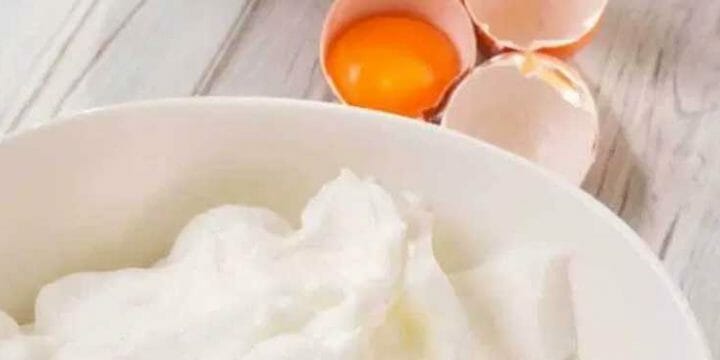I've experimented with various protein powders over my decade-long fitness career.
Recently, I've added pea protein powder to my regimen, finding it potentially superior to many animal-based options.
Today, I'll share why pea protein powder is good for you and why you should consider using it as an addition to your gym stack.
Quick Summary
- Pea protein powder is a good source of vegan protein.
- It has a satiating effect; hence, it's good for weight loss.
- Hydrolyzed pea protein decreases systolic blood pressure by 19 mmHg, showcasing its potential health benefits.
- From my perspective, pea protein stands out for its versatility and health benefits, making it a top choice for fitness enthusiasts and those seeking plant-based protein options.
What Is Pea Protein?

Pea protein, sourced from green and yellow split peas, is a top-notch dairy-free option, especially if you're allergic to dairy. It's gluten-free and allergy-friendly, making it a hit with vegans, vegetarians, and those ditching animal proteins.
Pea protein comes in these three forms:
- Pea protein isolates: This kind solely has the protein formulated by removing most other components found in peas.
- Pea protein concentrate: This kind has a higher protein content despite the possibility that it still contains other pea substances.
- Pea protein hydrolysates: These are substances that use particular techniques, such as heat, acid, or enzymes, to break down the protein gradually.
According to the National Library of Medicine, pea protein takes time to digest, slower than casein but faster than whey, making it ideal for quick and effective post-workout recovery [1].
It's also more filling than whey, perfect for those cutting back on calories and junk food cravings [2]. That's why it's my go-to recommendation for clients aiming to shed pounds.
I spent months reviewing and testing all pea protein products available and narrowed them down to the six best pea protein powders.
Pea Protein Powder Nutritional Value
Pea protein powder is nutritionally packed with the following elements per serving.
- Calories: 120g
- Total fat: 2g
- Protein: 25g
- Sodium: 288g
- Calcium: 50g
- Iron: 9g
It's important to note that pea protein is also a good source of fiber, which aids in digestion and promotes a feeling of fullness. This can be particularly beneficial for those looking to manage their weight. Additionally, pea protein is low in carbohydrates, making it a suitable option for low-carb diets.
Keep in mind that the nutritional value of pea protein powders may vary depending on the brand and manufacturer.
6 Health Benefits of Pea Protein Powder

Here are some of the proven health benefits of pea protein powder.
1. Improves General Athletic Performance
Pea protein may aid in muscle growth and post-workout recovery for athletes.
Leucine, isoleucine, and valine, branched-chain amino acids required for muscle growth and repair, can be found in pea protein in significant amounts [3].
Researchers have discovered that amino acids, like Leucine, in supplements with hydrolyzed protein are readily available for tissue repair during activity that damages muscle fibers and other types of muscular injury [4].
Some studies suggest that pea protein powders may benefit athletes by relieving muscular soreness, hastening the recuperation process after exercise, and boosting gains in lean muscle mass [5].
2. Reduces High Blood Pressure Risks
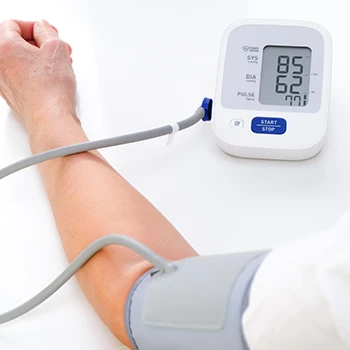
Pea protein might lower blood pressure because it has the amino acid arginine, which lowers hepatic cholesterol concentration and relaxes blood vessel walls [6].
The peptides created when pea protein is hydrolyzed or digested may also have blood pressure-lowering properties [7].
In controlled research with individuals with high blood pressure, it was shown that taking a combo protein isolate supplement made from peas lowers high blood pressure.
Hydrolyzed pea protein decreased systolic blood pressure by 19 mmHg [8].
3. Helps With Weight Loss
Pea protein can help people lose weight fast.
Thirty minutes before a meal, subjects ingested 20 grams of either casein protein, whey protein, pea protein, or water.
Pea protein was second to casein in terms of reducing appetite, which led to individuals ingesting less food overall [9].
"As a natural thickener, pea protein will particularly aid in satiety."
- Ralf Jager, Ph.D. FISSN
Pea supplements contain a modest amount of carbohydrates, about two to three grams per serving. This means taking pea protein equals taking fewer carbs overall.
4. Simple to Digest and Bioavailable
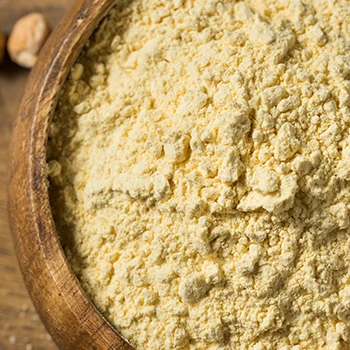
Pea protein contains an 86% digestibility rate, which should be safe if you experience gastrointestinal pain from protein powders [10].
Most of this protein is easily broken down and absorbed in your system without straining the gut.
5. Has Every Essential Amino Acid
Peas have 90% complete proteins, and their high-quality protein sources are full of vital amino acids.
The nine necessary amino acids are valine, isoleucine, tryptophan, phenylalanine, threonine, lysine, methionine, histidine, and Leucine, and it contains all of them [11].
These nine amino acids are necessary for the body to carry out crucial bodily activities.
6. High Iron Content

The body needs iron to transport oxygen to all parts efficiently.
Most dietary pea proteins have seven or more milligrams of iron per serving, which is more than a quarter of the recommended 12mg and 18 mg daily for women and men, respectively [12].
The body poorly absorbs plant iron, but vitamin C supplements and brown rice can fasten the process [13].
Pea protein can significantly boost iron if you're a vegan who doesn't receive iron nutrition from animal or dairy products.
Pea Protein Dosage and Consumption
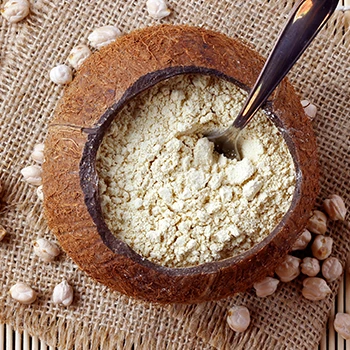
From my years in bodybuilding, I've seen pea protein outshine soy in muscle building. It blends seamlessly into my diet.
Muscle gain is optimal at 0.73 grams of protein per pound of body weight daily [14]. The National Library of Medicine encourages you to keep it below 2.3 grams per pound or 35% of your calories to avoid overloading your liver and kidneys, which can cause nausea or worse [15].
Best practice: consume pea protein 30-60 minutes before intense workouts like HIIT. Mix it in water, juice, or a smoothie. Add it to your muffin or pancake batter before the gym if there's time.
2 Potential Side Effects of Pea Protein

Pea protein hydrolysate is a quality source of plant-based protein, but consuming it in excess might have the following side effects.
1. Impaired Kidney Health
If you have kidney-related problems, seek expert advice before consuming pea protein powder.
Pea protein contains purines, which in high amounts can lead to increased uric acid, potentially straining the kidneys.
According to Mayoclinic, this can cause inflammation, joint pains, and gout [16].
2. High Sodium
Pea protein powder has a high sodium content, between 150 and 390 mg per serving, depending on the type.
As a result, if you're on a low-sodium diet, you may need to watch your pea protein intake.
FAQs
Can You Build Muscle With Pea Protein?
Yes, you can build muscle with pea protein because it has numerous amino acids for muscle growth.
How Well Is Pea Protein Absorbed?
Pea protein is absorbed better than most animal protein powders like casein.
Is Pea Protein Better Than Normal Protein?
Pea protein is better than normal protein, particularly for people allergic to dairy products.
Will Pea Protein Make Me Gain Weight?
Yes, pea protein will make you gain weight only if you consume it daily without regular exercise.
References:
- https://www.ncbi.nlm.nih.gov/pmc/articles/PMC7468723/
- https://symbiosisonlinepublishing.com/nutritionalhealth-foodscience/nutritionalhealth-foodscience65.php
- https://www.ncbi.nlm.nih.gov/pmc/articles/PMC5568273/
- https://www.ncbi.nlm.nih.gov/pmc/articles/PMC7231404/
- https://www.medicalnewstoday.com/articles/323093&
- https://www.ncbi.nlm.nih.gov/pmc/articles/PMC2728371/
- https://pubs.acs.org/doi/10.1021/jf201911p&ved=
- https://pubs.acs.org/doi/10.1021/jf201911p#
- https://www.ncbi.nlm.nih.gov/pmc/articles/PMC3295702/
- https://www.fda.gov/media/134207/download%
- https://www.researchgate.net/figure/Amino-acid-composition-of-raw-and-processed-pea-mg-100-g-of-product-means-standard_tbl1_45492297
- https://www.ncbi.nlm.nih.gov/books/NBK222309/
- https://pubmed.ncbi.nlm.nih.gov/6940487/
- https://www.acsm.org/docs/default-source/files-for-resource-library/protein-intake-for-optimal-muscle-maintenance.pdf&ved
- https://www.ncbi.nlm.nih.gov/pmc/articles/PMC1262767
- https://www.mayoclinic.org/symptoms/high-uric-acid-level/basics/causes/sym-20050607%
About The Author
You May Also Like

